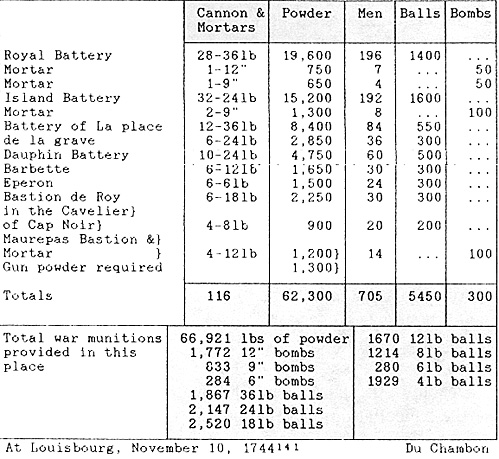The conflict in North America during the War of the Austrian Succession, perhaps more so than others, is rife with significant "what if's" that could have shifted the tides of fortune from one side to the other. Fortune seemed to smile on the English to an amazing degree, but a series of French blunders contributed in no small part to English victories.
If the French, rather than burning and abandoning Canso, had elected to remain there and establish a base, they would have denied the New Englanders a ready staging point for their descent upon Louisbourg. Stronger French resolve and proximity may have resulted in increased participation by the Acadians who were always ready to provide material assistance to the French cause but were loath to take up arms against the English.
Furthermore, since the initial French attacks on the English in 1744 were done in an atmosphere of surprise, it has been suggested that a more desirable place for the first assault would have been Annapolis Royal itself rather than Canso. Such a plan has much to recommend it. As the capital of Nova Scotia, Annapolis Royal's capture would have had a powerful impact on the morale of both sides. Since it lay only one or two day's sail further away than Canso, an assault would have been mounted under the same conditions of surprise, and the post must surely have succumbed to a force of 350 men supported by warships. With Annapolis Royal secured, Canso could have been plucked at leisure and the French goal of reoccupying Acadia accomplished. With Acadia secured, the recruitment of the reticent Acadians may have been more easily effected. Given the numerous French attempts to capture Annapolis Royal, it should have been the first place assaulted.
Similarly, if Duvivier had not been recalled from his abortive siege of Annapolis Royal, there may have been a different outcome. After several false starts, some French naval support ultimately did arrive, but too late to help force a capitulation, since Duvivier's force had already abandoned the siege. The loss of the capital of Nova Scotia would have been a harsh blow to the British military effort and a major boon to French War aims.
Duchambon's inept rejoinder to the New Englanders' assault on Louisbourg was also a decisive factor in the overall French defeat. He was short sighted in assuming that the landward approach to Louisbourg was completely protected by supposedly impassable swamps. When the British ships approached the coast, Morpain's force was altogether inadequate to the task of repulsing the assault. Although the strength of the Louisbourg garrison was weak, more troops should have been committed to repulsing the landing.
When the landing had been completed, the Royal Battery was hastily and unnecessarily abandoned and its guns imperfectly spiked by an anxious subordinate. Allowing this formidable bastion to fall into the hands of the enemy who could turn its complement of heavy guns against the works of Louisbourg was unforgivable.
The fate of Marin's relieving force is a consummate example of incredibly good luck on the part of the English. If Marin could have made the Gulf of Canso only a few hours earlier, he would have been able to get his entire command to Cape Breton Island unopposed by British shipping. The presence of 1,000 French and Indian troops to their rear would have jeopardized the New Englanders' position and necessitated the redeployment of a critical proportion of their force.
Another example of a "what if' concerns the destiny of D'Anville's ill-fated naval expedition. If the fleet had not been wracked by contrary weather and epidemics, it would have arrived before Louisbourg in substantially better trim and could possibly have wrested that stronghold back from the New Englanders whose army, wasted by disease, indiscipline, and the return of many of its ranks to New England, was a shadow of its former self. As it was, the mere account of the existence of D'Anville's fleet was sufficient to cause the cancellation of a massive expedition directed against Canada - another example of a "what-if."
In conclusion, much of the French war effort can be characterized as a succession of wasted opportunities and miscalculations stemming from a divided and feeble leadership. This, combined with incredibly bad luck, provided an atmosphere for defeat readily exploited by the vigorous actions of Shirley, Pepperell, Warren, and Mascarene.
Appendix I
State of the pieces of artillery which are in battery for the defense of the port and town of Louisbourg, and of the gunpowder necessary for fifty firings of the cannon, and the same for the mortars, and the minimum number of men needed to be placed in each battery in order to serve it.

King George's War 1744-1748
- Declaration of War
The Siege of Louisbourg
The Capitulation of Louisbourg
Plans for Further Conquests
The Border Wars
The Peace of Aix-La-Chapelle
Conclusions and Critique
Back to Seven Years War Asso. Journal Vol. VII No. 4 Table of Contents
Back to Seven Years War Asso. Journal List of Issues
Back to Master Magazine List
© Copyright 1994 by James E. Purky
This article appears in MagWeb.com (Magazine Web) on the Internet World Wide Web.
Other articles from military history and related publications are available at http://www.magweb.com